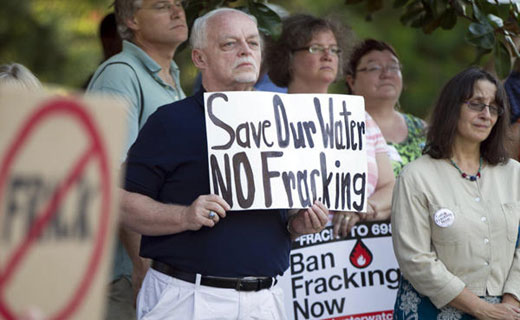
In the latest incident of environmental poisoning caused by fracking, a wastewater treatment facility in Pennsylvania is spewing radioactive water into the local Blacklick Creek. Fracking involves injecting water and chemicals into the ground to obtain natural gas, and when that dirty water comes back to the surface, it is normally taken to treatment plants for purification. But in this case, researchers discovered, the water is being re-released whilst still contaminated.
The discovery was made during a two-year Duke University study, with the latest water sample – taken in June of this year – confirming to researchers that harmful radioactive material is indeed present, even after supposed cleansing at the Josephine Brine Treatment Facility in Indiana County, Pa. Although the facility did remove 90 percent of the toxicity in the water, the study found that it wasn’t enough; the remaining contamination posed a major health and environmental risk.
“The levels that we found are much higher than what you allow in the U.S. for any place to dump radioactive material,” said Avner Vengosh, a Duke University professor who co-authored the study. “The radium will be bio-accumulating; you eventually could get it in the fish” in Blacklick Creek.
Shale gas production like that which is taking place in Pa. is terribly unregulated, as is the disposal of wastewater used in the operations. Fracking is exempt from legislation such as the Clean Water Act and the Safe Water Drinking Act. Frackers are allowed to monitor their own waste production due to a loophole rammed through in 2005 by Congress (at the urging of Dick Cheney) excepting corporations from federal scrutiny in regard to fracking chemicals. As a result, the natural gas industry has proven time and again that it cannot be trusted to be thorough and responsible in cleaning up after its operations (which themselves present a significant environmental threat).
Researchers involved with the study underscored how dire the situation in Indiana County is, noting that radium levels in the creek where supposedly purified wastewater was released were “200 times greater” than elsewhere in local waters. Study co-author and Duke professor of environmental science Robert Jackson added, “Each day, natural gas producers generate two billion gallons of wastewater. We have to do something with that. This wastewater is a consequence of our reliance – our addiction – to fossil fuels.”
Vengosh remarked, “We were surprised by the magnitude of radioactivity we found. It’s unusual to find that level” of toxicity.
Overall, fracking in the U.S. generated 280 billion gallons of wastewater in 2012, according to a new study by Environment America. That’s reportedly enough to flood all of Washington, D.C. beneath a 22 foot-deep toxic lagoon. Fracking by the Numbers, the report based on the study, stated, “Our analysis shows that damage from fracking is widespread and occurs on a scale unimagined just a few years ago.” And the wastewater that is supposedly cleaned at treatment facilities is not, in fact, being 100-percent purified, they learned.
“Fracking wastewater discharged from treatment plants can cause a problem for drinking water,” said the report. Furthermore, “when bromide in the wastewater mixes with chlorine (which is often used at the plants), it produces trihalomethanes, chemicals that can cause cancer and increase the risk of reproductive or developmental health problems.”
The troubling conclusion the study seemed to reach was that, throughout the U.S., there are many recurring incidents like the one in Indiana County, in which local rivers, streams, and creeks become polluted with supposedly treated water.
“What is happening is the direct result of a lack of any regulation,” Vengosh continued. “If the Clean Water Act was applied in 2005 when the shale gas boom started, this would have been prevented. Environmental regulation should be imposed to prevent this kind of radioactive buildup. This is a huge issue.”
Photo: An anti-fracking demonstration takes place in Pennsylvania. Robert Willett/AP












Comments